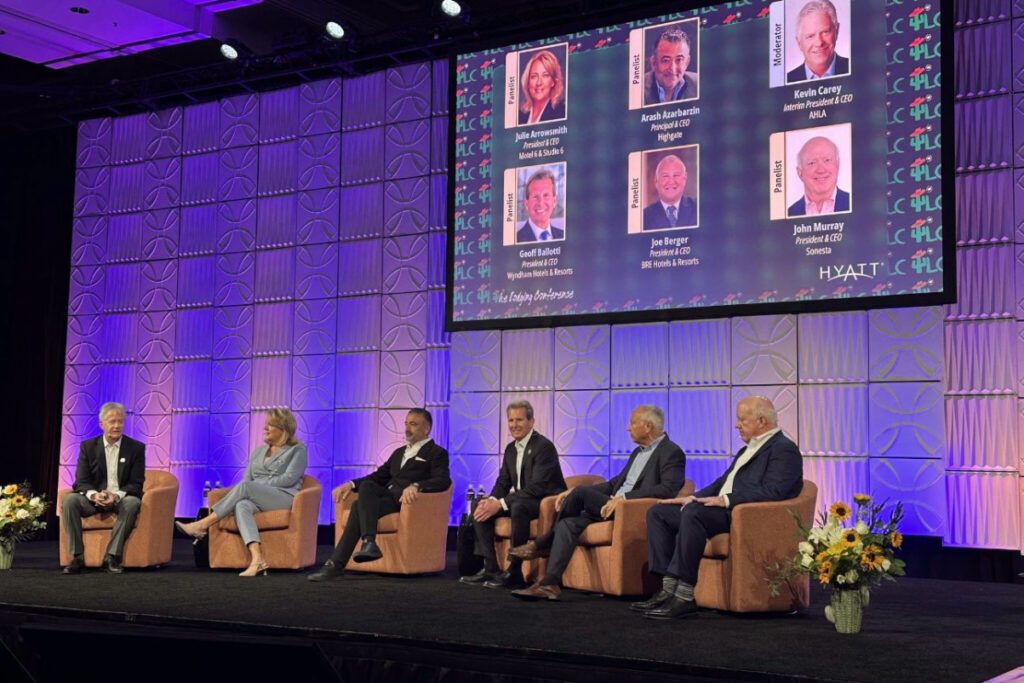
Skift Take
Hotel bigwigs are now pleading with Uncle Sam to roll out the red carpet for foreign visitors. They’re particularly miffed that in some countries visa wait times are about 250 days. In that time, you could watch the entire “Lord of the Rings” extended edition trilogy approximately 100 times.
Top executives in the U.S. hospitality industry are urging the government to take action to lift international tourism, which continues to lag in key markets.
“We’re a net exporter of travel,” said Geoff Ballotti, president and CEO of Wyndham Hotels & Resorts, at this week’s Lodging Conference in Phoenix.
Last year, nearly 99 million U.S. citizens traveled abroad, while about 67 million visitors arrived. Ballotti emphasized the need for a more competitive approach to attract international visitors. He noted the issue of visa wait times and comments by a State Department official at last month’s Skift Global Forum.
“At Skift Global Forum, you had [Deputy] Secretary of State [Richard] Verma up on stage talking about all the steps that our government is taking, and he was quick to admit they need to do more in terms of attracting inbound visitors,” Ballotti said. “Wait times, which have come down under his leadership from 400 days to 250 days, are still 250 days to get a visa. There is so much opportunity.”
Verma said the State Department has largely been able to get visa wait times back to pre-pandemic levels but acknowledged there’s more work to be done in some countries, including Mexico, Brazil, Colombia, and India. He said wait times are affected by the strong demand for travel to the U.S. and America’s security concerns.
Key Points
- Visa waiver program: Executives advocated for expanding the number of countries eligible for visa-free travel to the U.S. “There’s no reason we only allow 42 visa waiver countries when a country like the UK has a much broader visa waiver program,” Ballotti said.
- Inadequate marketing: Taking cues from countries like India and Spain, suggestions were made to boost promotional activities, including leveraging popular culture to showcase U.S. destinations. “We can take a page out of the India playbook and start advertising… in terms of just how great a place this is to visit,” Ballotti suggested.
- Regional disparities: U.S. hotels have seen a particular softness in Asian visitors, especially from China and Japan, which has affected West Coast markets and Hawaii. “We have gateway, full-service hotels in Seattle, Portland, San Francisco, and L.A. with demand levels down significantly,” said Sonesta CEO John Murray. “A lot of that is [lost] international demand, especially China.”
- Planning ahead for hosting major events. The executives stressed the importance of preparing for upcoming sporting events, viewing them as crucial opportunities to showcase the U.S. as a prime tourist destination. Arash Azarbarzin, CEO of Highgate, said: “Getting ready for the World Cup, getting ready for the Olympics, having ease of travel in place before these major events happen is crucial. We need to make tourism as seamless as possible.”
- Major events can benefit all types of hotels. “While we [at Motel 6] may not get many international tourists in our segment, big events like the World Cup and the Olympics bring in lots of technicians and back-of-the-house event managers that fill our hotels,” said Julie Arrowsmith, president & CEO of Motel 6 & Studio 6.
Accommodations Sector Stock Index Performance Year-to-Date
What am I looking at? The performance of hotels and short-term rental sector stocks within the ST200. The index includes companies publicly traded across global markets, including international and regional hotel brands, hotel REITs, hotel management companies, alternative accommodations, and timeshares.
The Skift Travel 200 (ST200)Â combines the financial performance of nearly 200 travel companies worth more than a trillion dollars into a single number. See more hotels and short-term rental financial sector performance.
Read the full methodology behind the Skift Travel 200.

